(DRCNet is pleased to welcome Allan Clear, executive director of the Harm Reduction Coalition, as a special guest correspondent for the Stop the Drug War Speakeasy. Allan is currently in Warsaw, Poland, attending the 18th International Conference on the Reduction of Drug Related Harm, and has graciously agreed to report for us on the proceedings. He has come through with photos and all. Because I was offline most of the last few days, Allan's first few posts are all coming out together in one. Any subsequent posts from the conference will come out one by one. Here Allan writes about getting to the place, the place, pre-conference meetings of the International Network of People Who Use Drugs and various satellite groups, and the conference's first day. - DB)
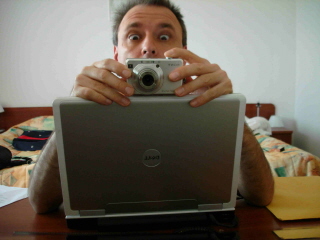 Allan Clear
Allan Clear
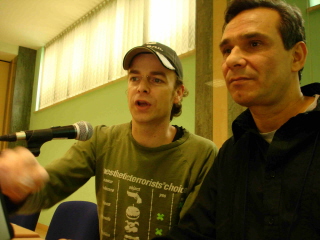 Stijn Goossens & Luiz Paolo Guanabara, at the conference
(Click the "read full post" link below or here to read Allan's full reports, with more pictures.)
It's the Journey, not the destination
Ah Poland! Who wouldn't want to travel to Europe to attend a conference at a hotel isolated out at the airport? It's reminiscent of a certain drug policy conference that took place at Newark airport a few years ago. At least I didn't have to sleep at that hotel. The beds sag, the lights don't work but the boiled cabbage is delicious. However this is the country of Jan Tomaszewski. I knew I was blessed when I found myself traveling on the ibogaine flight to Warsaw. If the plane lost altitude, a quick sprinkling of the magic alkaloid would resurrect us. Sadly, as luck would have it, Dana Beal accidentally walked through passport control in Munich and wasn't seen again for a few days. Rumors abounded that there was something evil living in his cowboy boots and it got released when he passed through the x-ray. The Germans went on high alert to track the evil down. Fortunately after a nap on a park bench Dana made it to Warsaw.
Stijn Goossens & Luiz Paolo Guanabara, at the conference
(Click the "read full post" link below or here to read Allan's full reports, with more pictures.)
It's the Journey, not the destination
Ah Poland! Who wouldn't want to travel to Europe to attend a conference at a hotel isolated out at the airport? It's reminiscent of a certain drug policy conference that took place at Newark airport a few years ago. At least I didn't have to sleep at that hotel. The beds sag, the lights don't work but the boiled cabbage is delicious. However this is the country of Jan Tomaszewski. I knew I was blessed when I found myself traveling on the ibogaine flight to Warsaw. If the plane lost altitude, a quick sprinkling of the magic alkaloid would resurrect us. Sadly, as luck would have it, Dana Beal accidentally walked through passport control in Munich and wasn't seen again for a few days. Rumors abounded that there was something evil living in his cowboy boots and it got released when he passed through the x-ray. The Germans went on high alert to track the evil down. Fortunately after a nap on a park bench Dana made it to Warsaw.
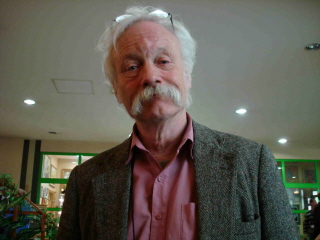 Dana Beal
Saturday network meeting
The International Harm Reduction Association (IHRA) hosted a meeting of regional and disciplinary networks. IHRA's relationship differs from network to network, from having informal ties to North American groups to actually funding and starting a network in Africa. IHRA's staff has grown over the last year and is now in a position to put some heft behind their desires. IHRA is planning on issuing a state of the universe policy document on global harm reduction activity sometime over the next year and will be soliciting information from the regional networks. The networks in attendance agreed to remain in contact and act together around international events such as the International Day on Drugs, next year's UNGASS review, the International AIDS Conference and the 2008 Commission on Narcotic Drugs meeting. The international conference on drug related harm will go onto a two-year schedule but not anytime soon. As well as the usual networks such as the Central and Eastern European Harm Reduction Network and the Asian Harm Reduction Network, it was good to have the presence of Marcus Day from the Caribbean Harm Reduction Coalition, Caitlin Padgett from the International Youth and Harm Reduction Initiative and Stijn Goossens from the International Network of People who Use Drugs. Apparently the Swiss are substantially funding a newish Middle East and North Africa Harm Reduction Network. And the African network has been resurrected. The biscuits were excellent and pierogies for dinner.
Sunday
Many satellite meetings took place on the day before the start of the conference â Eastern European networking, prisons, nurses â and the inaugural day long meeting of the International Network of People who Use Drugs. A year's planning coming out of last year's Vancouver meeting went into today's symposium. A truly international line up of global drug user activists enthralled the packed to overflowing congressional hall. Veteran Brazilian activist Luiz Paolo Guanabara provided a view of drug war oppression in the favelas of Rio and legalization efforts from Latin America and announced the formation of a Latin American Network of People who Use Drugs. Matt Curtis of OSI, Ann Livingston from VANDU and Stijn Goossens of INPUD opened up discussion on the international version of the draft manifesto by people who use illegal drugs "Nothing About Us Without Us". The manifesto was drafted in collaboration with Canadian HIV/AIDS Legal Network and International Harm Reduction Development and is heavily weighted towards HIV and HCV services. Users at the forum immediately felt this weakened the document. A lively debate ensued that settled on developing a stronger guiding document that talked more about civil rights, human rights and prohibition. The document can be commented on at the INPUD website http://www.inpud.org/ until June 30th. Grant McNally provided a fabulous presentation on the history of international drug user organizing. He's provided an excellent platform to build upon. Similarly the meeting set an excellent tone for the rest of the conference. The only thing missing was Andria giving birth at the back of the room. Can't have everything though.
Dana Beal
Saturday network meeting
The International Harm Reduction Association (IHRA) hosted a meeting of regional and disciplinary networks. IHRA's relationship differs from network to network, from having informal ties to North American groups to actually funding and starting a network in Africa. IHRA's staff has grown over the last year and is now in a position to put some heft behind their desires. IHRA is planning on issuing a state of the universe policy document on global harm reduction activity sometime over the next year and will be soliciting information from the regional networks. The networks in attendance agreed to remain in contact and act together around international events such as the International Day on Drugs, next year's UNGASS review, the International AIDS Conference and the 2008 Commission on Narcotic Drugs meeting. The international conference on drug related harm will go onto a two-year schedule but not anytime soon. As well as the usual networks such as the Central and Eastern European Harm Reduction Network and the Asian Harm Reduction Network, it was good to have the presence of Marcus Day from the Caribbean Harm Reduction Coalition, Caitlin Padgett from the International Youth and Harm Reduction Initiative and Stijn Goossens from the International Network of People who Use Drugs. Apparently the Swiss are substantially funding a newish Middle East and North Africa Harm Reduction Network. And the African network has been resurrected. The biscuits were excellent and pierogies for dinner.
Sunday
Many satellite meetings took place on the day before the start of the conference â Eastern European networking, prisons, nurses â and the inaugural day long meeting of the International Network of People who Use Drugs. A year's planning coming out of last year's Vancouver meeting went into today's symposium. A truly international line up of global drug user activists enthralled the packed to overflowing congressional hall. Veteran Brazilian activist Luiz Paolo Guanabara provided a view of drug war oppression in the favelas of Rio and legalization efforts from Latin America and announced the formation of a Latin American Network of People who Use Drugs. Matt Curtis of OSI, Ann Livingston from VANDU and Stijn Goossens of INPUD opened up discussion on the international version of the draft manifesto by people who use illegal drugs "Nothing About Us Without Us". The manifesto was drafted in collaboration with Canadian HIV/AIDS Legal Network and International Harm Reduction Development and is heavily weighted towards HIV and HCV services. Users at the forum immediately felt this weakened the document. A lively debate ensued that settled on developing a stronger guiding document that talked more about civil rights, human rights and prohibition. The document can be commented on at the INPUD website http://www.inpud.org/ until June 30th. Grant McNally provided a fabulous presentation on the history of international drug user organizing. He's provided an excellent platform to build upon. Similarly the meeting set an excellent tone for the rest of the conference. The only thing missing was Andria giving birth at the back of the room. Can't have everything though.
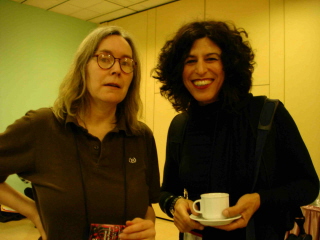 First Day
Does jet lag get worse with old age?
Not a bad day overall. Usual whining on my part but some of the same criticisms I have of the international conference are the same as I'd direct at our own US National Harm Reduction Conference. A unique feature of the international conference is how much they kowtow to politicians and "influential" guest speakers who don't really have a depth of experience in the field. The morning plenary featured a Baroness from the UK House of Lords. An anti prison campaigner who is right-on in her attitudes but had to beg off when someone asked why people can't get more than 40 mg of methadone in British prisons. The question was too technical for her. The representative from the International Red Cross who spoke about HIV in prisons stated that prison officials still think that sex in prison only occurs among "homosexuals" and had faith in education campaigns as a way of stopping HIV. However plenaries are really only scene setters and a doctor from Holland I spoke to told me that she found the plenary session to be very helpful. Can't argue with the Dutch after all. Also can't argue with the stellar lineup of day two's plenary either.
The INPUD HCV session was very good although there is very little focus on viral hepatitis at this conference. Also no workshops and very little training are on offer here. Kudos to the user network for putting this together. Which brings me to my second gripe that the conference has a pronounced HIV bent. Ours does too but it's a few degrees worse here. We might as well be at an HIV conference. Back to the session. Our own Tracy Swan was her usual brilliant, comprehensive self and Grant McNally from the UK was excellent and passionate. The session covered drug user's needs, data and strategies on how drug users can access treatment and then personal experience on living with HCV. Mauro Guarinieri provided commentary. Ok I have a bias. I feel that beyond academic thinking and research, harm reduction efforts in the States have been undervalued at these conferences. In the same way that lay HIV+ activists from the US became the voice of authority globally, I've yet to see anyone from outside the US that compares with our own HCV activists.
A panel on ethics was amusing but not particularly useful. Take home message was harm reduction is a good thing to do. Some people are just too clever for anyone's good.
Outside of safe injection spaces, US activists and programs have introduced more interesting solutions to drug overdose than anywhere else in the world. It was nice to hear some recognition of this influence. Someone from Wiltshire, England credited Dan Bigg for getting their program off the ground and I was told that HRC's overdose materials are used by trainers in Asia and in particular China. At the conference overdose session in the afternoon Traci Craig Green from Yale presented the results of her evaluation of naloxone programs in the US. We talked afterwards and she explained how clear cut the data was from her study. Those users trained in overdose prevention are heads and shoulders more effective at recognizing and responding to an overdose situation than untrained users. The clear message is expand naloxone programs, and education and training works. Nab Dasgupta from UNC provided a blindingly good breakdown on opiate overdose deaths related to prescription drugs in the US. Dave Marsh from Vancouver covered the need to effectively publicize to drug users when strong, bad, contaminated drugs hit the street. Most intriguingly he talked about recent deaths related to powdered methadone being sold as heroin in Vancouver. Police working with users communicated to the dealer the problem. The police promised not to prosecute the dealer for dealing, dead users or thieving from a pharmacy as long as he returned the rest of the stolen methadone. They retrieved 2/3 of the stolen methadone.
This international ligger ended the evening at a lovely OSI reception before heading downtown to watch harm reductionists experiment with vodka consumption at an outdoor consumption space.
First Day
Does jet lag get worse with old age?
Not a bad day overall. Usual whining on my part but some of the same criticisms I have of the international conference are the same as I'd direct at our own US National Harm Reduction Conference. A unique feature of the international conference is how much they kowtow to politicians and "influential" guest speakers who don't really have a depth of experience in the field. The morning plenary featured a Baroness from the UK House of Lords. An anti prison campaigner who is right-on in her attitudes but had to beg off when someone asked why people can't get more than 40 mg of methadone in British prisons. The question was too technical for her. The representative from the International Red Cross who spoke about HIV in prisons stated that prison officials still think that sex in prison only occurs among "homosexuals" and had faith in education campaigns as a way of stopping HIV. However plenaries are really only scene setters and a doctor from Holland I spoke to told me that she found the plenary session to be very helpful. Can't argue with the Dutch after all. Also can't argue with the stellar lineup of day two's plenary either.
The INPUD HCV session was very good although there is very little focus on viral hepatitis at this conference. Also no workshops and very little training are on offer here. Kudos to the user network for putting this together. Which brings me to my second gripe that the conference has a pronounced HIV bent. Ours does too but it's a few degrees worse here. We might as well be at an HIV conference. Back to the session. Our own Tracy Swan was her usual brilliant, comprehensive self and Grant McNally from the UK was excellent and passionate. The session covered drug user's needs, data and strategies on how drug users can access treatment and then personal experience on living with HCV. Mauro Guarinieri provided commentary. Ok I have a bias. I feel that beyond academic thinking and research, harm reduction efforts in the States have been undervalued at these conferences. In the same way that lay HIV+ activists from the US became the voice of authority globally, I've yet to see anyone from outside the US that compares with our own HCV activists.
A panel on ethics was amusing but not particularly useful. Take home message was harm reduction is a good thing to do. Some people are just too clever for anyone's good.
Outside of safe injection spaces, US activists and programs have introduced more interesting solutions to drug overdose than anywhere else in the world. It was nice to hear some recognition of this influence. Someone from Wiltshire, England credited Dan Bigg for getting their program off the ground and I was told that HRC's overdose materials are used by trainers in Asia and in particular China. At the conference overdose session in the afternoon Traci Craig Green from Yale presented the results of her evaluation of naloxone programs in the US. We talked afterwards and she explained how clear cut the data was from her study. Those users trained in overdose prevention are heads and shoulders more effective at recognizing and responding to an overdose situation than untrained users. The clear message is expand naloxone programs, and education and training works. Nab Dasgupta from UNC provided a blindingly good breakdown on opiate overdose deaths related to prescription drugs in the US. Dave Marsh from Vancouver covered the need to effectively publicize to drug users when strong, bad, contaminated drugs hit the street. Most intriguingly he talked about recent deaths related to powdered methadone being sold as heroin in Vancouver. Police working with users communicated to the dealer the problem. The police promised not to prosecute the dealer for dealing, dead users or thieving from a pharmacy as long as he returned the rest of the stolen methadone. They retrieved 2/3 of the stolen methadone.
This international ligger ended the evening at a lovely OSI reception before heading downtown to watch harm reductionists experiment with vodka consumption at an outdoor consumption space.
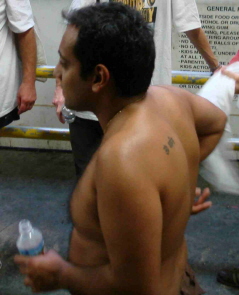 Nab Dasgupta in training
Nab Dasgupta in training
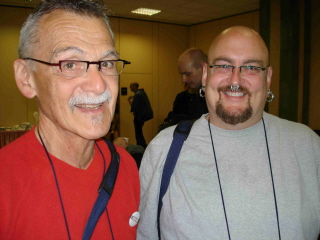 Walter Cavalieri & Don Young
Walter Cavalieri & Don Young
 Allan Clear
Allan Clear
 Stijn Goossens & Luiz Paolo Guanabara, at the conference
(Click the "read full post" link below or here to read Allan's full reports, with more pictures.)
It's the Journey, not the destination
Ah Poland! Who wouldn't want to travel to Europe to attend a conference at a hotel isolated out at the airport? It's reminiscent of a certain drug policy conference that took place at Newark airport a few years ago. At least I didn't have to sleep at that hotel. The beds sag, the lights don't work but the boiled cabbage is delicious. However this is the country of Jan Tomaszewski. I knew I was blessed when I found myself traveling on the ibogaine flight to Warsaw. If the plane lost altitude, a quick sprinkling of the magic alkaloid would resurrect us. Sadly, as luck would have it, Dana Beal accidentally walked through passport control in Munich and wasn't seen again for a few days. Rumors abounded that there was something evil living in his cowboy boots and it got released when he passed through the x-ray. The Germans went on high alert to track the evil down. Fortunately after a nap on a park bench Dana made it to Warsaw.
Stijn Goossens & Luiz Paolo Guanabara, at the conference
(Click the "read full post" link below or here to read Allan's full reports, with more pictures.)
It's the Journey, not the destination
Ah Poland! Who wouldn't want to travel to Europe to attend a conference at a hotel isolated out at the airport? It's reminiscent of a certain drug policy conference that took place at Newark airport a few years ago. At least I didn't have to sleep at that hotel. The beds sag, the lights don't work but the boiled cabbage is delicious. However this is the country of Jan Tomaszewski. I knew I was blessed when I found myself traveling on the ibogaine flight to Warsaw. If the plane lost altitude, a quick sprinkling of the magic alkaloid would resurrect us. Sadly, as luck would have it, Dana Beal accidentally walked through passport control in Munich and wasn't seen again for a few days. Rumors abounded that there was something evil living in his cowboy boots and it got released when he passed through the x-ray. The Germans went on high alert to track the evil down. Fortunately after a nap on a park bench Dana made it to Warsaw.
 Dana Beal
Saturday network meeting
The International Harm Reduction Association (IHRA) hosted a meeting of regional and disciplinary networks. IHRA's relationship differs from network to network, from having informal ties to North American groups to actually funding and starting a network in Africa. IHRA's staff has grown over the last year and is now in a position to put some heft behind their desires. IHRA is planning on issuing a state of the universe policy document on global harm reduction activity sometime over the next year and will be soliciting information from the regional networks. The networks in attendance agreed to remain in contact and act together around international events such as the International Day on Drugs, next year's UNGASS review, the International AIDS Conference and the 2008 Commission on Narcotic Drugs meeting. The international conference on drug related harm will go onto a two-year schedule but not anytime soon. As well as the usual networks such as the Central and Eastern European Harm Reduction Network and the Asian Harm Reduction Network, it was good to have the presence of Marcus Day from the Caribbean Harm Reduction Coalition, Caitlin Padgett from the International Youth and Harm Reduction Initiative and Stijn Goossens from the International Network of People who Use Drugs. Apparently the Swiss are substantially funding a newish Middle East and North Africa Harm Reduction Network. And the African network has been resurrected. The biscuits were excellent and pierogies for dinner.
Sunday
Many satellite meetings took place on the day before the start of the conference â Eastern European networking, prisons, nurses â and the inaugural day long meeting of the International Network of People who Use Drugs. A year's planning coming out of last year's Vancouver meeting went into today's symposium. A truly international line up of global drug user activists enthralled the packed to overflowing congressional hall. Veteran Brazilian activist Luiz Paolo Guanabara provided a view of drug war oppression in the favelas of Rio and legalization efforts from Latin America and announced the formation of a Latin American Network of People who Use Drugs. Matt Curtis of OSI, Ann Livingston from VANDU and Stijn Goossens of INPUD opened up discussion on the international version of the draft manifesto by people who use illegal drugs "Nothing About Us Without Us". The manifesto was drafted in collaboration with Canadian HIV/AIDS Legal Network and International Harm Reduction Development and is heavily weighted towards HIV and HCV services. Users at the forum immediately felt this weakened the document. A lively debate ensued that settled on developing a stronger guiding document that talked more about civil rights, human rights and prohibition. The document can be commented on at the INPUD website http://www.inpud.org/ until June 30th. Grant McNally provided a fabulous presentation on the history of international drug user organizing. He's provided an excellent platform to build upon. Similarly the meeting set an excellent tone for the rest of the conference. The only thing missing was Andria giving birth at the back of the room. Can't have everything though.
Dana Beal
Saturday network meeting
The International Harm Reduction Association (IHRA) hosted a meeting of regional and disciplinary networks. IHRA's relationship differs from network to network, from having informal ties to North American groups to actually funding and starting a network in Africa. IHRA's staff has grown over the last year and is now in a position to put some heft behind their desires. IHRA is planning on issuing a state of the universe policy document on global harm reduction activity sometime over the next year and will be soliciting information from the regional networks. The networks in attendance agreed to remain in contact and act together around international events such as the International Day on Drugs, next year's UNGASS review, the International AIDS Conference and the 2008 Commission on Narcotic Drugs meeting. The international conference on drug related harm will go onto a two-year schedule but not anytime soon. As well as the usual networks such as the Central and Eastern European Harm Reduction Network and the Asian Harm Reduction Network, it was good to have the presence of Marcus Day from the Caribbean Harm Reduction Coalition, Caitlin Padgett from the International Youth and Harm Reduction Initiative and Stijn Goossens from the International Network of People who Use Drugs. Apparently the Swiss are substantially funding a newish Middle East and North Africa Harm Reduction Network. And the African network has been resurrected. The biscuits were excellent and pierogies for dinner.
Sunday
Many satellite meetings took place on the day before the start of the conference â Eastern European networking, prisons, nurses â and the inaugural day long meeting of the International Network of People who Use Drugs. A year's planning coming out of last year's Vancouver meeting went into today's symposium. A truly international line up of global drug user activists enthralled the packed to overflowing congressional hall. Veteran Brazilian activist Luiz Paolo Guanabara provided a view of drug war oppression in the favelas of Rio and legalization efforts from Latin America and announced the formation of a Latin American Network of People who Use Drugs. Matt Curtis of OSI, Ann Livingston from VANDU and Stijn Goossens of INPUD opened up discussion on the international version of the draft manifesto by people who use illegal drugs "Nothing About Us Without Us". The manifesto was drafted in collaboration with Canadian HIV/AIDS Legal Network and International Harm Reduction Development and is heavily weighted towards HIV and HCV services. Users at the forum immediately felt this weakened the document. A lively debate ensued that settled on developing a stronger guiding document that talked more about civil rights, human rights and prohibition. The document can be commented on at the INPUD website http://www.inpud.org/ until June 30th. Grant McNally provided a fabulous presentation on the history of international drug user organizing. He's provided an excellent platform to build upon. Similarly the meeting set an excellent tone for the rest of the conference. The only thing missing was Andria giving birth at the back of the room. Can't have everything though.
 First Day
Does jet lag get worse with old age?
Not a bad day overall. Usual whining on my part but some of the same criticisms I have of the international conference are the same as I'd direct at our own US National Harm Reduction Conference. A unique feature of the international conference is how much they kowtow to politicians and "influential" guest speakers who don't really have a depth of experience in the field. The morning plenary featured a Baroness from the UK House of Lords. An anti prison campaigner who is right-on in her attitudes but had to beg off when someone asked why people can't get more than 40 mg of methadone in British prisons. The question was too technical for her. The representative from the International Red Cross who spoke about HIV in prisons stated that prison officials still think that sex in prison only occurs among "homosexuals" and had faith in education campaigns as a way of stopping HIV. However plenaries are really only scene setters and a doctor from Holland I spoke to told me that she found the plenary session to be very helpful. Can't argue with the Dutch after all. Also can't argue with the stellar lineup of day two's plenary either.
The INPUD HCV session was very good although there is very little focus on viral hepatitis at this conference. Also no workshops and very little training are on offer here. Kudos to the user network for putting this together. Which brings me to my second gripe that the conference has a pronounced HIV bent. Ours does too but it's a few degrees worse here. We might as well be at an HIV conference. Back to the session. Our own Tracy Swan was her usual brilliant, comprehensive self and Grant McNally from the UK was excellent and passionate. The session covered drug user's needs, data and strategies on how drug users can access treatment and then personal experience on living with HCV. Mauro Guarinieri provided commentary. Ok I have a bias. I feel that beyond academic thinking and research, harm reduction efforts in the States have been undervalued at these conferences. In the same way that lay HIV+ activists from the US became the voice of authority globally, I've yet to see anyone from outside the US that compares with our own HCV activists.
A panel on ethics was amusing but not particularly useful. Take home message was harm reduction is a good thing to do. Some people are just too clever for anyone's good.
Outside of safe injection spaces, US activists and programs have introduced more interesting solutions to drug overdose than anywhere else in the world. It was nice to hear some recognition of this influence. Someone from Wiltshire, England credited Dan Bigg for getting their program off the ground and I was told that HRC's overdose materials are used by trainers in Asia and in particular China. At the conference overdose session in the afternoon Traci Craig Green from Yale presented the results of her evaluation of naloxone programs in the US. We talked afterwards and she explained how clear cut the data was from her study. Those users trained in overdose prevention are heads and shoulders more effective at recognizing and responding to an overdose situation than untrained users. The clear message is expand naloxone programs, and education and training works. Nab Dasgupta from UNC provided a blindingly good breakdown on opiate overdose deaths related to prescription drugs in the US. Dave Marsh from Vancouver covered the need to effectively publicize to drug users when strong, bad, contaminated drugs hit the street. Most intriguingly he talked about recent deaths related to powdered methadone being sold as heroin in Vancouver. Police working with users communicated to the dealer the problem. The police promised not to prosecute the dealer for dealing, dead users or thieving from a pharmacy as long as he returned the rest of the stolen methadone. They retrieved 2/3 of the stolen methadone.
This international ligger ended the evening at a lovely OSI reception before heading downtown to watch harm reductionists experiment with vodka consumption at an outdoor consumption space.
First Day
Does jet lag get worse with old age?
Not a bad day overall. Usual whining on my part but some of the same criticisms I have of the international conference are the same as I'd direct at our own US National Harm Reduction Conference. A unique feature of the international conference is how much they kowtow to politicians and "influential" guest speakers who don't really have a depth of experience in the field. The morning plenary featured a Baroness from the UK House of Lords. An anti prison campaigner who is right-on in her attitudes but had to beg off when someone asked why people can't get more than 40 mg of methadone in British prisons. The question was too technical for her. The representative from the International Red Cross who spoke about HIV in prisons stated that prison officials still think that sex in prison only occurs among "homosexuals" and had faith in education campaigns as a way of stopping HIV. However plenaries are really only scene setters and a doctor from Holland I spoke to told me that she found the plenary session to be very helpful. Can't argue with the Dutch after all. Also can't argue with the stellar lineup of day two's plenary either.
The INPUD HCV session was very good although there is very little focus on viral hepatitis at this conference. Also no workshops and very little training are on offer here. Kudos to the user network for putting this together. Which brings me to my second gripe that the conference has a pronounced HIV bent. Ours does too but it's a few degrees worse here. We might as well be at an HIV conference. Back to the session. Our own Tracy Swan was her usual brilliant, comprehensive self and Grant McNally from the UK was excellent and passionate. The session covered drug user's needs, data and strategies on how drug users can access treatment and then personal experience on living with HCV. Mauro Guarinieri provided commentary. Ok I have a bias. I feel that beyond academic thinking and research, harm reduction efforts in the States have been undervalued at these conferences. In the same way that lay HIV+ activists from the US became the voice of authority globally, I've yet to see anyone from outside the US that compares with our own HCV activists.
A panel on ethics was amusing but not particularly useful. Take home message was harm reduction is a good thing to do. Some people are just too clever for anyone's good.
Outside of safe injection spaces, US activists and programs have introduced more interesting solutions to drug overdose than anywhere else in the world. It was nice to hear some recognition of this influence. Someone from Wiltshire, England credited Dan Bigg for getting their program off the ground and I was told that HRC's overdose materials are used by trainers in Asia and in particular China. At the conference overdose session in the afternoon Traci Craig Green from Yale presented the results of her evaluation of naloxone programs in the US. We talked afterwards and she explained how clear cut the data was from her study. Those users trained in overdose prevention are heads and shoulders more effective at recognizing and responding to an overdose situation than untrained users. The clear message is expand naloxone programs, and education and training works. Nab Dasgupta from UNC provided a blindingly good breakdown on opiate overdose deaths related to prescription drugs in the US. Dave Marsh from Vancouver covered the need to effectively publicize to drug users when strong, bad, contaminated drugs hit the street. Most intriguingly he talked about recent deaths related to powdered methadone being sold as heroin in Vancouver. Police working with users communicated to the dealer the problem. The police promised not to prosecute the dealer for dealing, dead users or thieving from a pharmacy as long as he returned the rest of the stolen methadone. They retrieved 2/3 of the stolen methadone.
This international ligger ended the evening at a lovely OSI reception before heading downtown to watch harm reductionists experiment with vodka consumption at an outdoor consumption space.
 Nab Dasgupta in training
Nab Dasgupta in training
 Walter Cavalieri & Don Young
Walter Cavalieri & Don YoungThis work by StoptheDrugWar.org is licensed under Creative Commons Attribution-ShareAlike 4.0 International
Add new comment